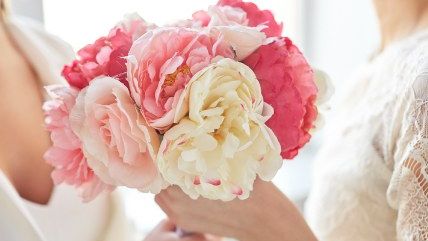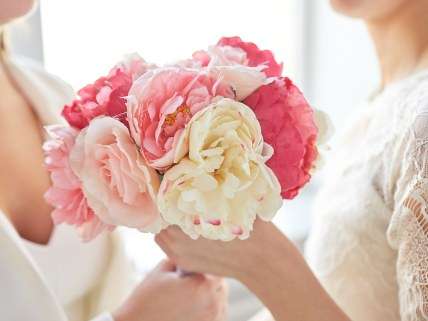Florists Join Bakers, Photographers in Court Ruling Ordering Them to Serve Gay Weddings
You will bring me flowers, or else.


Florists—at least those in Washington State—can be forced to provide their goods and services for gay weddings. That was the unanimous decision from the state's supreme court handed down yesterday.
The high-profile case, which had been winding through the courts for a while, pitted Baronnelle Stutzman, owner of Arlene's Flowers in Richland, against a gay couple who had come to her seeking her flowers for their wedding. She declined, citing her religious opposition to recognizing same-sex marriage.
As had happened in other cases involving bakers and wedding venues, this decision put Stutzman on a collision course with the state's public accommodation antidiscrimination laws. Washington forbids discrimination on the basis of sexual orientation.
Stutzman's argument was that she wasn't discriminating on the basis of the men being gay but rather refusing to participate in the wedding (which wasn't even legally recognized by the state when they started planning it in 2013). She argued that government mandating her participation by requiring her to provide flowers violated her constitutional rights to free speech, free exercise, and free association.
The court roundly rejected all of her claims. The decision noted courts had previously rejected claims that attempted to separate "status" from "conduct" in similar ways, that, for example, discriminating against somebody who is pregnant falls under sex discrimination. As for her attempt to invoke her religious freedoms, they noted that the Supreme Court has set the precedent that "that individuals who engage in commerce necessarily accept some limitations on their conduct as a result."
As for her free speech claim, the court has shared the position that we've seen in similar cases: They say Requiring Stutzman to prepare flowers for a same-sex marriage is not actually compelling her to endorse said marriages. This is very similar to how courts have ruled on wedding cakes. They have declined to accept the argument that the creation of a wedding cake is in and of itself expressive speech, but a baker does have the freedom to reject orders to pass along a particular textual message. (I explained the almost comically absurd complexity of this line of legal reasoning here years ago).
Perhaps even a little more concerning, even if they did accept floral arranging as a form of expressive speech, it still might not have changed their ruling. In a similar case in New Mexico, a photographer lost a fight to refuse to shoot a gay wedding. Pretty much everybody understands that photography is expressive speech. But this majority decision agreed with the New Mexico court's decision, which concluded, "[W]hile photography may be expressive, the operation of a photography business is not."
That is the kind of logic that can end up in all sorts of bad places: "While the publication of a newspaper may be expressive, the operation of a media business is not." The operation of a business is indeed expressive. It remains deeply frustrating to see the courts (and the American Civil Liberties Union) continue to sometimes cling to an idea that people lose some of their freedoms simply by engaging in commerce, which is itself a type of freedom.
The Cato Institute submitted an amicus brief defending the florist's right to say no to the couple as a First Amendment issue. Cato (like Reason) has long supported legal recognition for same-sex couples. That's not the issue here; it's a matter of free speech (or compelled speech, in this situation).
The Alliance Defending Freedom, which represented the shop (and was just designated a "hate group" by the Southern Poverty Law Center) is promising to try to get the case before the U.S. Supreme Court.
I'm skeptical the high court would take the case. They've already refused to hear the previous wedding photography case, and that's a much more straightforward example of expressive speech. And so far, the business owners have been losing all these cases. There's no conflict in judicial rulings that the Supreme Court needs to resolve, as yet.
Read the ruling here.


Show Comments (275)